As we move into 2025, the world of food and nutrition continues to evolve, influenced by years of research, changing lifestyles, and a better understanding of how what we eat affects both our health and the planet.
Together, let’s uncover the predictions of 2025’s next food trends and some of the most influential nutrition movements this year, guided by expert insights and a quest for a healthier, more sustainable future.
- Eating for Brain Health and Cognitive Performance
- Supporting Mental Health through Nutrition
- The rising demand for protein
- Intermittent Fasting or Time-Restricted Feeding
- Ozempic for Weight Loss Goals
- Plant Based Diets for Personal and Planetary Health
- Online Grocery Shopping, AI Technology and Convenience
- Embracing Multicultural Cuisines
- Financial and Budget Eating
- Gut Health and Anti-Inflammatory Foods

1. Eating for Brain Health and Cognitive Performance
Brain health and healthy aging continues to be a focus for consumers in 2025, with a surge in interest surrounding cognitive-enhancing foods.
More than 60% of people surveyed (more than 5,000 consumers across China, the United Kingdom, and the United States) are prioritizing products that support brain functions.
According to the 2025 Trend Report by Nourish Food Marketing, people are looking for more functional foods to support healthy aging and maintain healthy brain functions.
This shift towards brain-friendly habits is also influencing alcohol consumption patterns, with many people opting for less alcohol to promote overall well-being.
There is a rise of options for non-alcoholic beers, wines and spirits as well as emerging lower-alcohol alternatives (ie. 2.5% beer, 8% wine).
Additionally, there’s a move away from relying on coffee and energy drinks for energy boosts.
The market is seeing an influx of enriched food and beverage products with added B vitamins, omega-3s, and nootropics, natural or synthetic drugs or supplements such as ginkgo biloba, L-theanine, caffeine and creatine, that may improve mental and cognitive skills, however their precise effects and safety are unknown.
In the 12th Annual What’s Trending in Nutrition Survey, anti-inflammatory foods such as blueberries, avocados, green tea made the list for properties that promote overall wellness and longevity:
- Blueberries contain antioxidants which may help reduce the risk of chronic diseases.
- Avocados are packed with fiber, heart-healthy fats, magnesium, and potassium. They are also rich in antioxidants, which may decrease cancer risk.
- Green tea is well known for its antioxidant and anti-inflammatory properties. Drinking green tea regularly may be linked to the decreased risk of heart disease, cancer, Alzheimer’s disease and more.
Another trending nutrient is choline, an essential nutrient vital for brain health and cognitive function. Despite its importance, Health Canada estimates that Canadians do not consume enough choline.
This has led to an increase in consumer interest and searches for choline-rich foods, such as eggs, liver, meat, fish, and dairy products, as well as plant-based choline options like soybeans.
2. Supporting Mental Health through Nutrition
As consumers become more attuned to the mind-body connection, mental health is increasingly seen as closely tied to our diets.
A balanced diet can help reduce the risk of nutrient deficiencies and mood disorders such as anxiety and depression. This growing understanding is driving a shift toward a more holistic approach to wellness, recognizing that there’s no health without mental health.
Luckily, we are seeing an increased support through the corporate world committing to support their employee’s mental health.
Our most popular presentation “Supporting Mental Health through Nutrition” remains the most requested topic from our corporate clients.
One of the essential nutrients gaining attention is omega-3 fatty acids. Known for their support of both brain and heart health, adequate consumption of omega-3s are linked to reduced risk of depression and anxiety.
These fats, found in foods like fish, seafood, flaxseeds, nuts and seeds are becoming key components of well balanced diets aimed at supporting mental health.
Alongside the growing focus on nutrient-dense foods, it is equally important to develop a healthy relationship with food.
A balanced, sustainable approach to eating that fits within your lifestyle – free from guilt or restriction – can contribute significantly to emotional well-being.
Ultimately, mental health is complex. Having a supportive healthcare team will be key in creating an individualized care plan.
By combining nutrient-dense foods with mindful eating habits, we can better support mental health and overall well-being, contributing to a healthier, more balanced life.
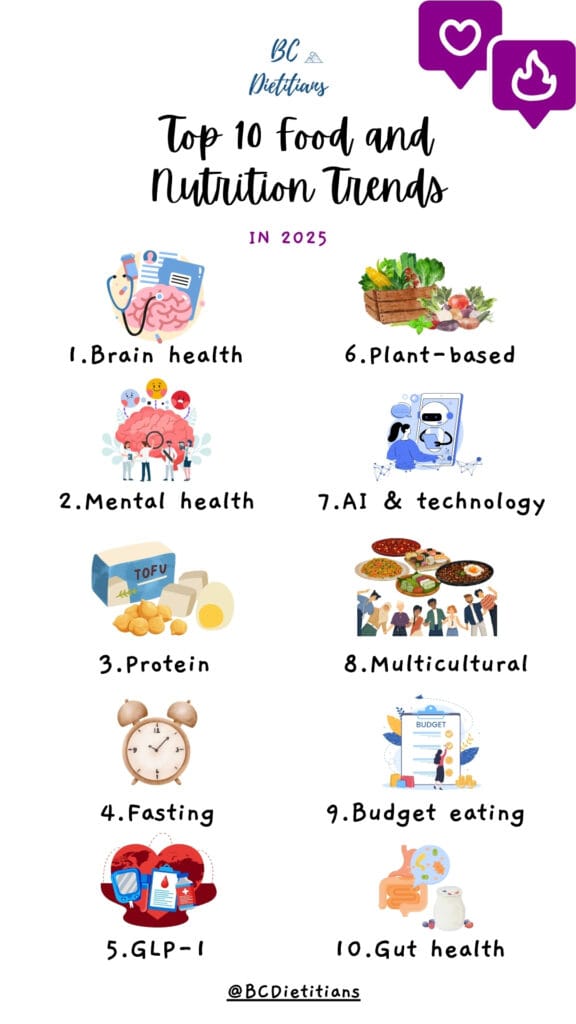
3. The rising demand for protein
The demand for high-protein diets continues to surge in 2025, as awareness grows around the importance of muscle for strength, physical performance, and metabolic health.
In fact, 71% of consumers are actively seeking to increase their protein intake. Muscle is widely recognized as a key element of longevity, with maintaining muscle mass being essential for health and metabolism.
Plant-based proteins are playing an increasingly vital role in this trend, and innovation in the protein space is also flourishing at home.
For instance, cottage cheese – once considered a simple staple – is now being reinvented in various forms, such as high protein ice cream and flatbreads. Recipes featuring high protein ingredients like cottage cheese are becoming more popular as consumers seek creative ways to incorporate more protein into their diets.
Meanwhile, plant-based alternatives, including soy-free options, plant-based fish, and vegan cheeses, are gaining traction as more people look for diverse protein sources that are more environmentally friendly.
Protein is an essential macronutrients for health, but, like all nutrients, moderation is important. Consuming it in excess can strain the body and lead to potential issues, such as an imbalance of other nutrients, kidney stress.
BC dietitians can play a key role in determining your specific protein needs, taking into account factors such as your activity level and weight management goals.
4. Intermittent Fasting or Time-Restricted Feeding
Intermittent fasting (IF) has been rated as the most popular diet trend according to the 12th Annual What’s Trending in Nutrition Survey.
It is an eating pattern that involves cycling between periods of eating and fasting. A common method is the 16:8 approach, where individuals fast for 16 hours – typically overnight – and eat during an 8-hour window.
This pattern is touted to align with our natural circadian rhythms and may be considered an accessible approach for those looking to improve health or lose weight.
In addition to weight loss, research suggests IF may improve heart health and boost insulin sensitivity. Fasting may support a healthier gut microbiome, which is linked to better digestion and mental health.
What makes IF even more appealing in 2025 is the ease of tracking and support through apps like MyFitnessPal, which help individuals stay on track by setting fasting windows and tracking progress. As more people embrace IF for its health benefits beyond weight management, the trend will continue to thrive.
It’s important to consult an experienced dietitian before starting any fasting regimen, particularly for those with health conditions or a history of disordered eating and eating disorders.
5. Ozempic for Weight Loss Goals
We continue to see the rise of using Ozempic and Mounjaro (GLP-1 medications) for weight loss goals.
Many clients are coming to us for guidance on managing side effects, working on behavioral changes to be able to maintain sustainable results. Ozempic and Mounjaro are injectable medications used to lower blood sugar levels in type 2 diabetes.
These GLP1 drugs have gained popularity for weight loss purposes due to its ability to suppress appetite and promote satiety. Unfortunately, many people were started on these medications without proper support and are realizing they do not or cannot afford to be on these medications for life.
People are looking to dietitians for guidance before starting Ozempic, seeking advice on how to prepare their body nutritionally to maximize the effectiveness of the medication.
This includes preparing meals that are balanced, nutrient-dense, and satisfying to prevent nutrient deficiencies and manage side effects like nausea, fatigue, and digestive discomfort. In addition, food companies such as Danone are taking advantage of this trend to target food products specifically for people who are taking GLP-1 drugs.
A significant concern for those using Ozempic is the post-phase weight re-gain.
After discontinuing the medication or completing a weight-loss phase, many people worry about regaining the weight they’ve lost and research has also supported that most people will regain their weight when they come off the medication.
This has created a demand for personalized, long-term strategies that focus on behavioral changes and mindset shifts before and after starting GLP-1 medications such as Ozempic to minimize weight-regain.
Dietitians are essential in helping clients maintain a healthy, balanced approach to weight management that doesn’t rely on quick fixes like medications alone.
We highly recommend consulting with a BC dietitian before starting Ozempic so that we can provide you with personalized advice that aligns with your weight loss goals and treatment plan.
6. Plant-Based Diets for Personal and Planetary Health
In 2025, the trend towards plant-based diets continues to grow, not just for personal health benefits but also for environmental sustainability.
As people become more aware of the impact of their food choices on the planet, they are increasingly adopting diets rich in plant-based proteins. This shift is driven by a recognition that plant-based diets can significantly reduce carbon footprints and promote biodiversity, helping to address climate change and environmental degradation.
According to the National Research Council Canada, 40 percent of Canadians are actively including more plant-based foods into their diet. Interested to learn more about how your diet affects the planet? Check out this Planet-Based Diets Impact Calculator.
Canada’s role as a leading producer of these crops further fuels this trend locally – Did you know that Canada is the largest producer of dry peas and lentils in the world?
The plant forward movement is more popularity, offering a balanced approach to incorporating plant-based foods while enjoying meat and dairy in moderation. One way to get started with a vegetarian diet is adopt a flexitarian diet, also known as semi-vegetarian, where one consumes primarily plant-based foods and enjoys meat and dairy products in moderation.
While faux and meatless meats made from soy-based ingredients have been around for decades, we are seeing more plant-based protein options : some innovative products we have tasted at the food forward summit include plant-based fish, frozen meals, vegan cheese options, vegan desserts & baked goods, plant-based cultural foods, soy-free products and vegan honey. ‘Blended’ or ‘lessitarian’ products are also emerging with a blend of both meat and plant-based foods.
One way to explore and get started with a vegetarian diet is to adopt a flexitarian diet, also known as semi-vegetarian, where one consumes primarily plant-based foods and enjoys meat and dairy products in moderation.
If you’re exploring the flexitarian lifestyle, be sure to check out our updated blog on “6 Easy Vegetarian Recipes for Busy People” for a curated list of simple vegetarian meals to get started!
Needing professional guidance on switching to a plant-based diet? Our BC dietitians are experienced with different types of vegetarian diets including: Vegan, Pescatarian, Lacto-ovo Vegetarian, Lacto Vegetarian, Raw Vegan, and Flexitarian diets.
7. Online Grocery Shopping, AI Technology and Convenience
We are more reliant on technology for meal planning, grocery shopping and meal prep more than ever.
These tools and options are reshaping how Canadians interact with their food choices, enhancing user experiences through personalized recommendations, meal plans, shopping lists, and streamlined delivery processes.
Statistics Canada reported a 74% increase in online grocery shopping in 2020, a trend that has maintained momentum. AI-driven platforms have made this possible by simplifying the shopping process, offering tailored suggestions based on past purchases, dietary preferences, and even current pantry inventories.
AI technology, including tools like ChatGPT, offers a wealth of information and can be a helpful resource for general questions around nutrition and health. However, it’s crucial to use AI with caution, especially when it comes to personalized health and nutrition advice.
AI largely depend on existing online information to generate responses and suggestions. This poses a significant challenge in the context of nutrition and health advice, as the internet is a sea of misinformation and unverified claims.
As it can be challenging for AI to discern credible sources from inaccurate or misleading ones – the advice provided by AI may not always be accurate or in line with evidence-based practices. More important, the advice may not be suitable for you specifically.
Additionally, personalized nutrition counseling from dietitians has been linked with better dietary adherence and accountability, resulting in more significant improvements in health markers in chronic diseases like diabetes.
Connect with a BC dietitian nutritionist for your personalized nutrition plan today!

8. Connected to a Wider World: Embracing Multicultural Cuisines
Generation Alpha (those born after 2012), enjoys a multicultural peer group, which significantly influences their culinary tastes.
They are more adventurous in their food choices, readily embracing a wide variety of global flavors and dishes.
This openness has led to a transformation in family meals, where globally-inspired recipes and products are making their way into a typical household, catering to a generation that is born with a multicultural palate in a connected world.
9. Financial and Budget Eating Considerations
In 2025, the financial resolutions and goals of Canadians are significantly influencing their approach to food and nutrition.
With over 30% of Canadians changing their financial New Year’s Resolutions to focus on minimizing spending and creating budgets, there is a clear trend towards seeking value-for-money in food choices without compromising on health and quality.
This includes a growing interest in home cooking, sourdough baking, bulk buying, and choosing seasonal produce.
BC dietitians can help clients create personalized nutrition plans that consider both your health needs and budget constraints.
This includes strategies on cost-effective food choices, reducing food waste, meal planning, and smart grocery shopping. Many extended health benefits also cover the cost of dietitian services, be sure to check and make the most out of your benefits!
10. Let’s not forget about the gut health and anti-inflammatory foods
Gut health and immunity will also be one of the driving forces of change in the food landscape, as noted in the survey results from Pollock Communications and Today’s Dietitian.
Maintaining a healthy gut microbiome is undoubtedly a priority for many.
When 70 percent of the immune system resides in the gut, keeping the digestive tract healthy is important. Foods that support a healthy gut and immune system will remain popular in 2025, and these foods include prebiotics and probiotics.
- Prebiotics are dietary fibres from whole grains, onions, garlic, bananas, tomatoes and legumes; these are foods for probiotics.
- Probiotics are live and active bacteria that bring health benefits, such as improved immunity and digestion.
Under Canadian food regulations, a product is considered a probiotic food when the food has proven to contain adequate amounts of the live strains of the bacteria to suggest a health benefit.
Dairy products such as yogurt and aged cheese are examples of probiotic foods. Not all foods must be dairy to contain probiotics.
To find out if the product is a true probiotic product, always read the packaging and look for the term ‘probiotic’ and the amount and types of active live strains of bacteria present.
Our gut health dietitians can help you optimize your gut health and support your immune system.
Conclusion
As we look toward the future of food and nutrition in 2025, it’s clear that trends are becoming more interconnected – focusing not only on personal health but also on sustainability and global impact.
From brain health and mental wellness to protein innovations and plant-based eating, it’s essential to stay informed and make choices that align with both our well-being and the environment.
With expert guidance and a commitment to balanced, sustainable eating, we can all contribute to a healthier, more sustainable future.
Connect with a BC dietitian nutritionist for your personalized nutrition plan today!
Blog Contributors:
Amy Chow, Registered Dietitian
Novella Lui, Registered Dietitian
Eileen Huang, BSc. Food, Nutrition, and Health
References:
- Affordability and Gut Health Predicted as Leading Food Purchase Drivers in 2024. https://www.prnewswire.com/news-releases/affordability-and-gut-health-predicted-as-leading-food-purchase-drivers-in-2024-302061882.html Accessed on January 14, 2025.
- Allergy and the gastrointestinal system. https://www.ncbi.nlm.nih.gov/pmc/articles/PMC2515351/ Accessed on January 14, 2025.
- Berries: anti-inflammatory effects in humans. https://pubmed.ncbi.nlm.nih.gov/24512603/ Accessed on January 14, 2025.
- Canada’s food guide Use of Labels. https://food-guide.canada.ca/en/healthy-eating-recommendations/using-food-labels/ Accessed on January 14, 2025.
- BMO Survey: One-Third of Canadians Expect to Curtail their Spending in 2025. BMO Survey: One-Third of Canadians Expect to Curtail their Spending in 2025 | Newsroom.BMO. Accessed on January 14, 2025.
- Effectiveness of probiotics on the duration of illness in healthy children and adults who develop common acute respiratory infectious conditions: a systematic review and meta-analysis. https://www.ncbi.nlm.nih.gov/pmc/articles/PMC4054664/ Accessed on January 13, 2025.
- Green tea (Camellia sinensis) for the prevention of cancer. https://pubmed.ncbi.nlm.nih.gov/32118296/ Accessed on January 13, 2025.
- GLP-1 Foods, Nutrition, and Support | Danone North America. https://www.danonenorthamerica.com/glp-1-food-nutrition-support.html Accessed January 14, 2025.
- Health Benefits and Chemical Composition of Matcha Green Tea: A Review. https://www.ncbi.nlm.nih.gov/pmc/articles/PMC7796401/ Accessed on January 13, 2025.
- Intermittent fasting and health outcomes: an umbrella review of systematic reviews and meta-analyses of randomised controlled trials. https://www.thelancet.com/journals/eclinm/article/PIIS2589-5370(24)00098-1/fulltext Accessed January 14, 2025.
- Let’s go (online) shopping! https://www.statcan.gc.ca/o1/en/plus/183-lets-go-online-shopping Accessed January 14, 2025.
- Nourish Food Marketing 2025 Trend Report. Nourish-Food-Marketing-Trend-Report-2025-EN.pdf Accessed on January 14, 2025.
- Omega-3 fatty acids and mental health. https://www.sciencedirect.com/science/article/pii/S241464472030004X Accessed January 14, 2025.
- Plant-Based Diet Impacts Calculator. How does what you eat in Canada affect the planet? (panda.org). Accessed January 13, 2025.
- Plant-based protein market: global and Canadian market analysis. Sector Trend Analysis – Plant-based protein food and drink trends in Canada – agriculture.canada.ca Accessed on January 14, 2025.
- Prebiotics and Postbiotics. https://badgut.org/information-centre/a-z-digestive-topics/prebiotics-probiotics/ Accessed on January 14, 2025.
- Probiotics and Gastrointestinal Conditions: An Overview of Evidence from the Cochrane Collection. https://www.ncbi.nlm.nih.gov/pmc/articles/PMC5683921/ Accessed on January 14, 2025.
- Products – Save Da Sea Foods. https://www.savedasea.com/savedaseaproducts Accessed January 14, 2025.
- Questions and Answers on Probiotics. https://www.canada.ca/en/health-canada/services/food-nutrition/food-labelling/health-claims/questions-answers-probiotics.html Accessed on January 12, 2025.
- Soy-free Tofu. https://bigmountainfoods.com/products/soy-free-tofu Accessed January 14, 2025.
- Cashew Cheese – Spread’em Kitchen. https://spreademkitchen.com/collections/cashew-cheeze-blocks Accessed January 14, 2025.
- Summary of Health Canada’s safety assessment of L-alpha-glycerylphosphorylcholine for use as a supplemental ingredient. https://www.canada.ca/en/health-canada/services/food-nutrition/reports-publications/summary-safety-assessment-l-alpha-glycerylphosphorylcholine-use-supplemental-ingredient.html Accessed January 14, 2025.
- The Forgotten Fruit: A Case for Consuming Avocado Within the Traditional Mediterranean Diet. https://www.ncbi.nlm.nih.gov/pmc/articles/PMC7272688/ Accessed on January 12, 2025.
- The impact of intermittent fasting on gut microbiota: a systematic review of human studies. https://www.frontiersin.org/journals/nutrition/articles/10.3389/fnut.2024.1342787/full Accessed January 14, 2025.
- The International Scientific Association of Probiotics and Prebiotics (ISAPP) consensus statement on the definition and scope of postbiotics. https://www.nature.com/articles/s41575-021-00440-6 Accessed on January 12, 2025.
- The trends defining the $1.8 trillion global wellness market in 2024. https://www.mckinsey.com/industries/consumer-packaged-goods/our-insights/the-trends-defining-the-1-point-8-trillion-dollar-global-wellness-market-in-2024 Accessed on January 14, 2025
- 2024 IFIC Food & Health Survey. https://foodinsight.org/wp-content/uploads/2024/06/2024-IFIC-Food-Health-Survey.pdf Accessed January 14, 2025.
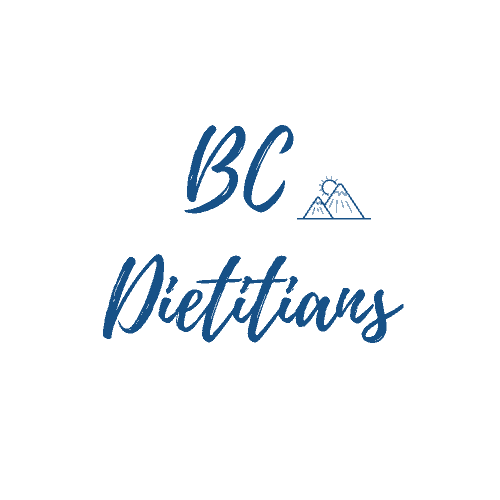


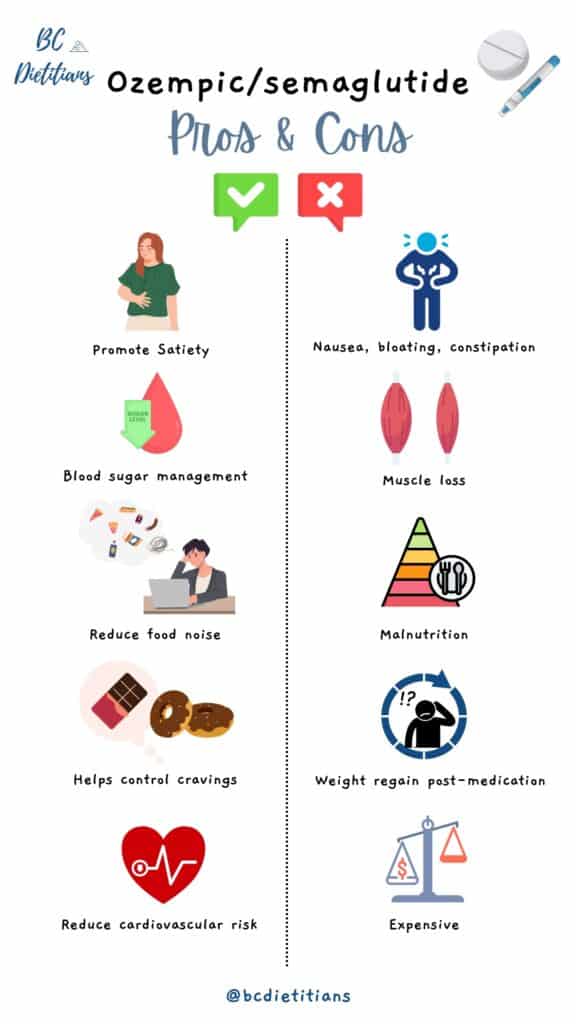
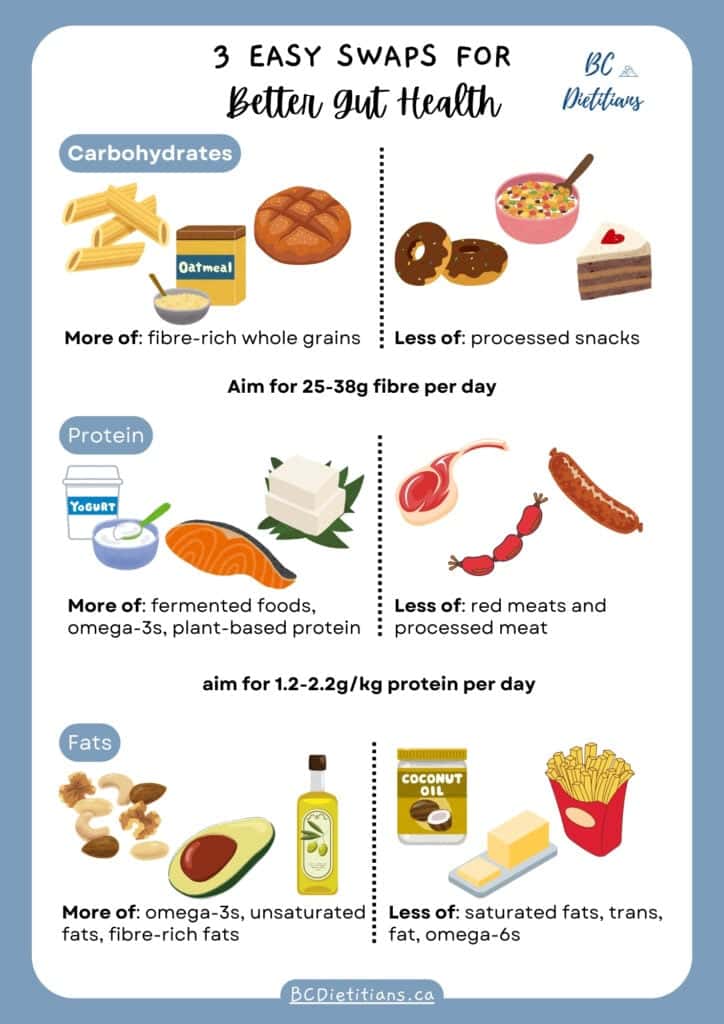




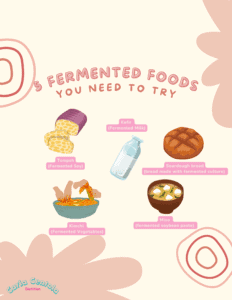


Add a comment